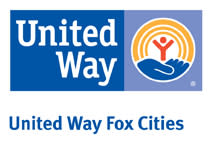In 2023, 23% of workers in Wisconsin’s 20 most common jobs lived in households that couldn’t afford basics, according to new data from United Way Fox Cities and its research partner United For ALICE. These workers – the backbone of every community – include personal care aides, counter workers, cashiers and servers.
The State of ALICE in Wisconsin reveals that traditional measures of poverty have severely undercounted the number of households statewide that are living in financial hardship. While 11% of all households in Wisconsin lived in poverty in 2023, the new research shows that 24% – more than twice as many – were ALICE® (Asset Limited, Income Constrained, Employed). Combined, 35% of Wisconsin’s households fell below the ALICE Threshold of Financial Survival in 2023.
ALICE households bring in less than the basic costs of housing, childcare, food, transportation, health care and technology, plus taxes. Yet because their income is above the Federal Poverty Level, they often don’t qualify for assistance.
“When we underestimate how many households are struggling, we underestimate what it truly takes to build thriving communities,” said Lisa Kogan-Praska, CEO of United Way Fox Cities. “This means entire families and essential workers may be overlooked for support, left without the resources they need to stay healthy, achieve financial stability and reach their fullest potential. That’s a loss not just for ALICE, but for all of us.”
The crux of the struggle for ALICE families is the gap between wages and expenses. In 2023, a family of four in Wisconsin needed $77,112 just to cover the essentials, nearly three times the Federal Poverty Level of $30,000. Yet even with both parents working full time in two of the state’s most common jobs (a personal care aide and a stock worker/order filler) this family’s combined income still fell short of the cost of basics by $10,522.
“The 211-resource line offers a very immediate window into the challenges people face every day,” said Lisa Smith, Director of 211 at United Way Fox Cities. “At 211, we’re hearing from more people who are working and earning above the federal poverty line yet still can’t make ends meet. At the heart of ALICE’s struggle is a simple but devastating mismatch: the cost of basics keeps rising, but wages aren’t keeping up. Many of our callers don’t fit the traditional definition of poverty and often don’t qualify for assistance, but they are still overwhelmed by rising costs of housing, childcare, and other necessities, leaving them financially stretched and vulnerable.”
The State of ALICE in Wisconsin also reveals that in 2023:
- Wisconsin ranked 8th in financial hardship among all 50 states plus the District of Columbia, with one of the nation’s lowest percentages of households struggling to make ends meet.
- Some groups face financial hardship at disproportionate rates, with 60% of the youngest and 48% of the oldest households in Wisconsin falling below the ALICE Threshold, compared with 28% of households headed by someone age 25-44.
- Housing continues to be an obstacle for struggling families. Among households below the ALICE Threshold in Wisconsin, 72% of households that rented and 55% of those that owned were rent and housing burdened – meaning they paid 30% or more of their income on rent and housing costs.
“ALICE families are especially vulnerable during natural disasters and times of economic uncertainty and yet often feel unseen or left behind,” said Stephanie Hoopes, Ph.D., National Director at United For ALICE. “By providing a name and a way to quantify these households, we’re equipping communities with the data to build solutions that offer better choices and real pathways to stability.”
About United Way Fox Cities
United Way Fox Cities is a tax-exempt, donor-supported organization that mobilizes our community to action so all can thrive. For over 75 years, we have partnered with local individuals, nonprofits, and businesses to co-create solutions to our region’s most pressing challenges. True to our founding spirit, we respond whenever there is a need—bringing people together, actively listening, and addressing concerns with a comprehensive, local approach. From strengthening community resilience to advancing health, youth opportunity, and financial stability, we’re working toward a future where everyone in the Fox Cities can reach their full potential. United Way Fox Cities also operates the regional 211 call center, connecting thousands each year to essential services and support. Learn more at www.unitedwayfoxcities.org. About United For ALICE
United For ALICE is a U.S. research organization driving innovation, research and action to improve life across the country for ALICE® (Asset Limited, Income Constrained, Employed) and for all. Through the development of the ALICE measurements, a comprehensive, unbiased picture of financial hardship has emerged. Harnessing this data and research on the mismatch between low-paying jobs and the cost of survival, ALICE partners convene, advocate and collaborate on solutions that promote financial stability at local, state and national levels. This grassroots ALICE movement, led by United Way of Northern New Jersey, has spread to 35 states and the District of Columbia and includes United Ways, corporations, nonprofits and foundations in Alabama, Arkansas, Colorado, Connecticut, Delaware, Florida, Georgia, Hawai‘i, Idaho, Illinois, Indiana, Iowa, Kansas, Kentucky, Louisiana, Maine, Maryland, Michigan, Minnesota, Mississippi, New Jersey, New Mexico, New York, North Carolina, Ohio, Oklahoma, Oregon, Pennsylvania, South Carolina, Tennessee, Texas, Virginia, Washington, Washington, D.C., West Virginia and Wisconsin; we are United For ALICE. For more information, visit: UnitedForALICE.org.
